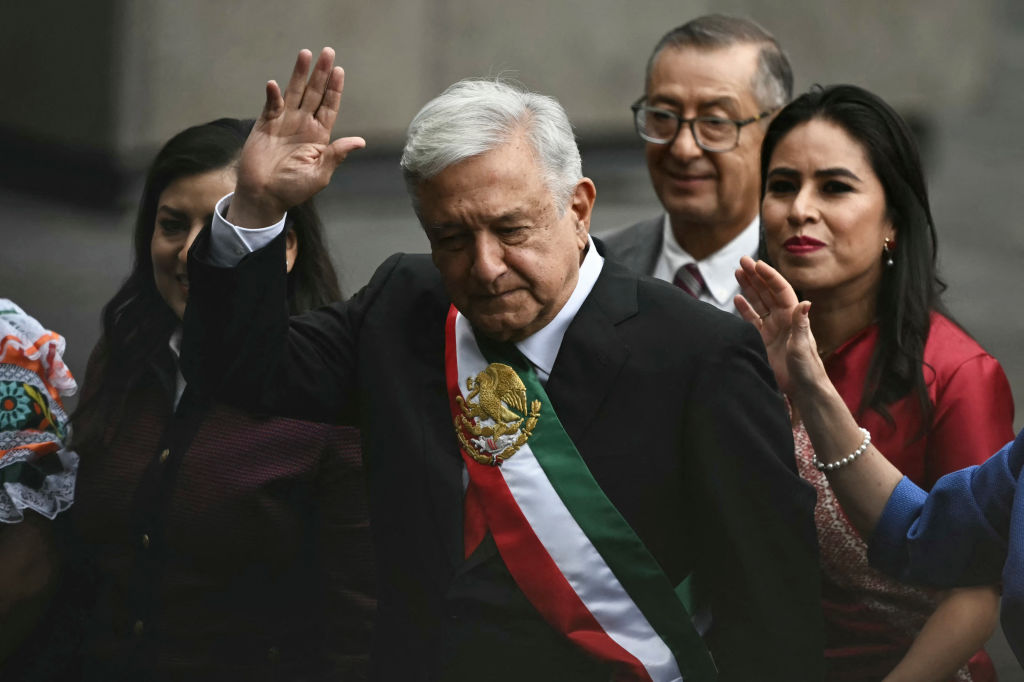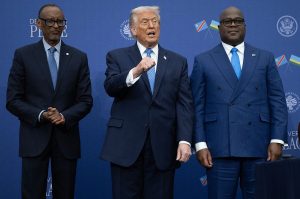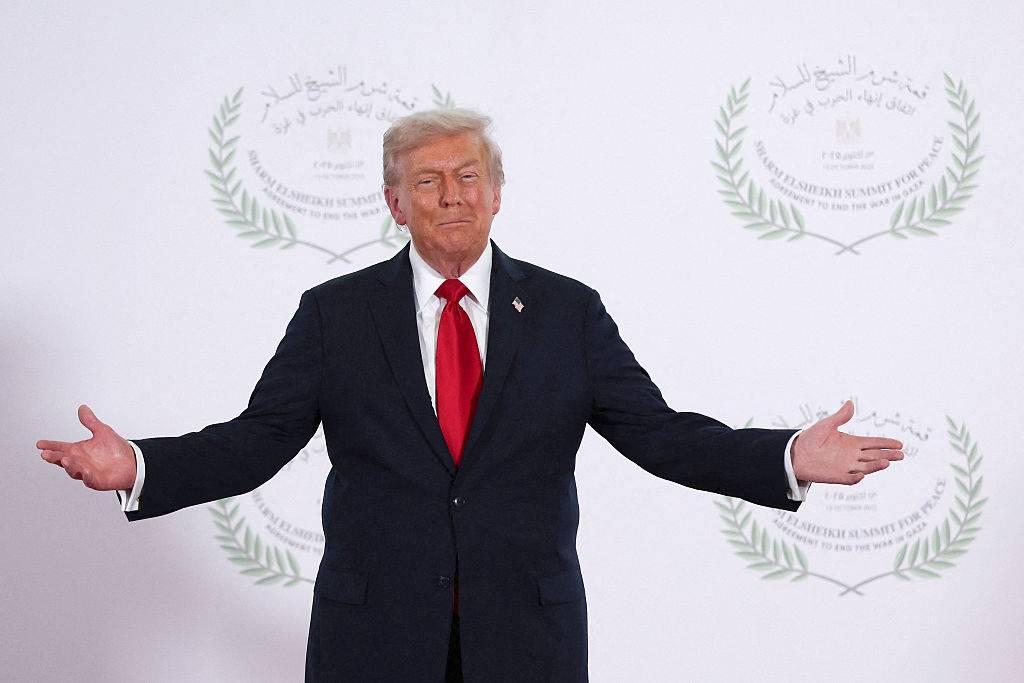“The Mexican drug-trafficking organizations have an intolerable alliance with the government of Mexico,” announced the White House last month, buried in the official statement on US tariffs on that country’s goods. The declaration has sent shockwaves through Mexico.
If true — if the government of our southern neighbor acts in concert with, defends, condones and/or profits from the trafficking cartels that have killed hundreds of thousands of Americans and worked to destroy American sovereignty in recent years — then it is a seismic pronouncement that heralds a new era of confrontation between the two nations.
A Mexican state that allied with the enemies of the United States, on those enemies’ behalf, would be as intolerable to the United States as Noriega’s Panama or bin Laden’s al-Qaeda. Arguably it would be worse, as none of those antagonists shared 2,000 miles of land frontier with the United States.
The question is, therefore: is it true?
The answer, obvious to nearly all of us who have worked in, with and for US-Mexico policy across many years, is: yes, it is wholly true. It is so true, and so manifest, that the shock for the informed is not that President Donald J. Trump declared the Mexican state a narco-regime, but that it didn’t happen years ago. After years of complacency under a somnolent Biden regime, US policy is awakening to reality.
To catalog the particulars of the present Mexican regime’s full partnership with the cartels — and the Sinaloa Cartel in particular — would require a lengthy exposition. (See, for example, the updated 2025 report from the Texas Public Policy Foundation on the extensive history of Mexican state-cartel collusion.) Nevertheless, the toplines are sufficient to make the case. It is necessary to understand that the Mexican state is now essentially a single-party, left-populist regime, aligned ideologically and operationally with comparable regimes in Cuba and Venezuela. Like those regimes, it regards its nation’s trafficking cartels as vehicles for profit and control and also agents of national policy abroad — especially but not only in the United States.
The central figure in the Mexican-regime case is the man who served as president of Mexico from 2018 through 2024 and still controls the ruling MORENA coalition through his proxies and family members throughout the party apparatus. Andrés Manuel López Obrador, in addition to being an inveterate anti-American in his demagogic politics, is widely understood to have been in the pay of the Sinaloa Cartel for most of the past twenty years.
This was more or less common knowledge in Mexico, and the regime did not trouble itself to hide the evidence. AMLO, as he is known, spent nearly his entire presidency defending the Sinaloa Cartel against the Americans, and sometimes against his own security apparatus. He paid more visits to the Sinaloan Cartel headquarters town of Badiraguato across six years than he did to Washington, DC; he took a special trip to pay respects to the elderly mother of jailed drug lord Joaquin “El Chapo” Guzman Loera; he ordered his own security forces to release one of El Chapo’s captured sons; he intervened to spring the cartel-corrupted Mexican flag officer Salvador Cienfuegos from American detention; he effectively banned US law enforcement from working in Mexico; and he even vowed to use the Mexican armed forces to defend the cartels against American action.
This is not even the whole list, but it will do.
AMLO was never concerned about the Mexican public seeing all this: what were they going to do? He was, on the other hand, exceptionally alarmed when, hardly a year ago, both ProPublica and the New York Times reported on years-old US Department of Justice investigations of the money connections between him and the Sinaloa Cartel. The thesis, supported by much evidence, was that AMLO and the Sinaloans struck a deal in which the former would supply protection and the latter supply money — and occasional coercive muscle in elections. The US investigation was killed by the Obama administration, which never could bring itself to hold Latin American leftists to account: but the revival of the trope in popular press was intolerable to AMLO, who threatened the American reporters and outlets involved.
Like all Mexican cartel bosses, Andrés Manuel doesn’t fear whatever passes for justice in his own country. He does, however, fear the justice of the United States.
All that would be enough, and that’s the public and empirical evidence. The widely understood but unverifiable narratives — unverifiable because verification may be lethal — are even more extraordinary. In 2022, I wrote on the incredible story, related to me by a major figure in Mexican civics and media, of an alleged intervention by the Sinaloa Cartel in a Mexican-state election. Mexico being a more deadly country for journalists than even unhappy Syria, this sort of unfalsifiable relaying of tales is much of what passes for reporting in this sphere. Yet the point here is that the rumors are unnecessary to make the case for the existence of the Mexican government-cartel alliance: what we know, and can verify, is enough.
It would be a mistake, in reading this recounting of AMLO and his longstanding liaison with the brutal Sinaloan Cartel, to conclude that he is a singular figure and un-representative of the whole. Doubtless he is overdue for an accounting by both the people of the United States and Mexico, and it ought to be the policy of the administration in Washington, DC, now to reopen the investigations that the Obama administration closed and bring him to justice. Yet he is merely representative of the whole. A full telling of the tale would include the aforementioned General Salvador Cienfuegos, once at the helm of Mexico’s defense establishment and known in cartel circles as “El Padrino;” and it would include Adan Agusto Lopez, until recently second in line to the Mexican presidency, who made sure to include Cartel Jalisco Nueva Generacion leadership in his governing team in the State of Tabasco. It would include the MORENA governor of Veracruz, Cuitláhuac García, who struck a deal to bring the Cartel del Noreste into his state. And it would include uncounted numbers more, men and women holding office and MORENA-party posts, all of them selling their national patrimony in some fashion to cartels that are now recognized, as of January 20, 2025, by the United States as foreign terror organizations.
Their terror exists here as well as in Mexico, of course. Mexicans know it because they have been slaughtered by the hundreds of thousands across the past two decades. Americans know it because we know the horrifying costs of the fentanyl, illegal-substance and human trafficking that are the profit centers for the cartels with whom the Mexican state allies. What Americans do not know, but should, is that the Mexican state-cartel alliance actively seeks to impose its political will in the United States itself.
MORENA party cells exist in major American cities and will stage public events at the demand of the party center: for example in picketing the New York Times for reporting on AMLO’s cartel connections, or in putting up posters of AMLO in Laredo, Texas. Mexican consulates across America render aid to illegal aliens in the United States, protecting the remittances that are a major source of cartel income. The Mexican state has long sought to interfere in, and sway, American elections. The (mostly imaginary) availability of the tens of millions of Americans of Mexican descent — including me — to fight for Mexico inside America is a longstanding surety and trope of the present Mexican regime. I have been told directly by a senior advisor to Mexico’s current president that this is an ace in the Mexican deck, and though it is a species of delusion, it is also properly disturbing in the extreme.
The Mexican presidency changed hands on October 1, 2024, from AMLO to his longtime protégé Claudia Sheinbaum, a technocrat handpicked for her near-total absence of political independence. The entire apparatus, cartel connections and all, remains in place — and in charge. If you doubt it, look now to the Mexican-officialdom reaction to the White House simply speaking the truth. There is an element of reflexive nationalism in it to be sure, the timeless response of Mexican civics confronted with even the most-reasonable American critiques. But there is something more: interests threatened, and fear of the only real instrument of justice for narcos and their allies in this hemisphere: the United States of America.
The Trump administration deserves full credit for speaking the plain truth. There is an “intolerable alliance” between the Mexican cartels and the government of Mexico. What follows in policy and action from this is the choice of the American government — and the fault, in full, of the Mexican one.


























Leave a Reply